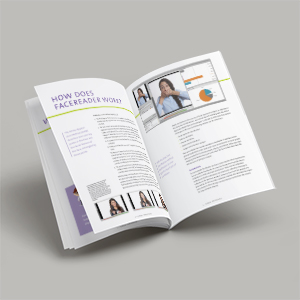Why you want to find out if your customers are bored

Emotions deeply influence our daily lives, shaping our moods and behaviors - including our decision making. That's why facial expression analysis is often used in consumer and behavior research.
Posted by
Published on
Thu 16 May. 2024
Emotions deeply influence our daily lives, shaping our moods and behaviors. When you feel happy, you are more likely to have a productive day at work and enjoy the things you do. It might also make you more receptive to that billboard you saw at the bus stop on your way to work.
On the other hand, if you are moody or even getting bored while watching an advertisement, chances are you are not very interested in the product - let alone buy it.
Why are emotions important to study?
No wonder researchers, advertisers, and marketers are interested in studying these emotions.
They play a key role in non-verbal communication and decision making, and are essential to understanding human behavior. For the same reason, many marketing conferences are filled with talks about advertisement effectiveness or the most persuasive texts for packaging design.
This general interest in emotions is one of the reasons that facial expression analysis is often used in consumer and behavior research. Emotion data provides crucial insights that allow researchers to explain complex human behaviors in greater depth.
Limitations of self-reports on emotion
How do you get this emotion data? You can always just ask some directly, for example, in a survey. However, it is unlikely that you get honest, objective replies.
That's because people usually find it very difficult to comment on their own emotions and state of mind.
Self-reported emotions are not necessarily what a person is actually feeling at that moment. Moreover, asking how someone feels also means you get an ‘after the fact’ reply, while you may want to know their real-time emotions.
Also try this blog post about consumer experiences during a self-designing process
Analyze emotions in real-time
That’s exactly why facial expression analysis software like FaceReader is such a valuable addition as a research tool in consumer behavior research, as it helps you to collect objective data in real-time.
Based on the original basic or universal emotions defined by Paul Ekman1, FaceReader automatically determines the presence and intensity of emotional states happy, sad, angry, surprised, scared, and disgusted. The software also recognizes contempt and a neutral state.
This will ensure better understanding of interactions between people, or between people and machines or products.

Affective attitudes predict behavior
Another perspective from which to study emotion is to include measurement of affective attitudes. Attitudes describe the way we evaluate things, in a negative or positive way. This includes three different elements: affective attitudes (emotions), cognitions (thoughts and knowledge), and actions (past behaviors or experiences).2
The strength of an affective attitude is often a good predictor of behavior. In other words, the stronger the attitude, the more likely it is that it affects behavior. This means that knowing a person’s affective attitude can help predict their behavior.
This is valuable information for consumer behavior researchers and marketers, as this can also help with predicting whether people will buy a product after seeing an advertisement.
You may also like this blog post about influencer marketing for young adults: Disclosure Dilemma
Custom expressions in FaceReader
In the FaceReader software, you can study the emotions of participants by measuring three common affective attitudes as custom expressions: interest, boredom, and confusion.
To estimate these custom expressions, FaceReader determines the intensities of a number of facial action units (AUs), which refer to muscle movements in the face. These intensities are combined with other cues, like head shaking and nodding.
These secondary facial affects - available in the Action Unit Module - are more complex than the basic emotions. They are not completely expressed within a single instance, but computed over a window of time.
Measuring affective attitudes supports your marketing efforts
Including affective attitudes in your research helps you to gain better insights in how an audience engages with your content or advertisement.
Knowing whether your test participants get bored by watching your advertisement for your new product launch can make all the difference in the success of it.
References
- Ekman, P. Friesen, W.V. (1971). Constants across cultures in the face and emotion. Journal of Personality and Social Psychology, 17, 124-129.
- https://en.wikipedia.org/wiki/Attitude_(psychology) (WP:CC BY-SA).
Related Posts

FaceReader and different scientific theories on emotion

Comparing machine emotion recognition with a human benchmark

